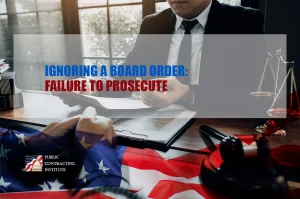IGNORING A BOARD ORDER: FAILURE TO PROSECUTE By Richard D. Lieberman, Consultant & Retired Attorney.
Both the Armed Services Board of Contract Appeals (“ASBCA”) and the Civilian Board of Contract Appeals (“CBCA”) have clear rules that permit the boards to take remedial or even arguably punitive action in the case where a party (government or contractor) fails to comply with a board order.
At the ASBCA, Board Rules 16 & 17 work together as follows:
Rule 16. Sanctions. If any party fails to obey an order issued by the Board, the Board may impose such sanctions as it considers necessary to the just and expeditious conduct of the appeal.
Rule 17. Dismissal or Default for Failure to Prosecute or Defend. Whenever the record discloses the failure of either party to file documents required by these Rules, respond to notices or correspondence from the Board, comply with orders of the Board, or otherwise indicates an intention not to continue the prosecution or defense of an appeal, the Board may, in the case of a default by the appellant, issue an order to show cause why the appeal should not be dismissed with prejudice for failure to prosecute. In the case of a default by the Government, the Board may issue an order to show cause why the Board should not act thereon pursuant to Rule 16. If good cause is not shown, the Board may take appropriate action.
At the CBCA, Board Rule 35(b), Standards of conduct; Sanctions, states:
35(b) Sanctions. If a party or its representative, attorney, expert, or consultant fails to comply with any direction or order of the Board (including an order to provide or permit discovery) or engages in misconduct affecting the Board, its process, or its proceedings, the Board may make such orders as are just, including the imposition of appropriate sanctions. Sanctions may include, but are not limited to: []
(1) Taking the facts pertaining to the matter in dispute to be established for the purpose of the case in accordance with the contention of the party who is not at fault; [or]
(6) Dismissing the case or any part thereof [.] or
(9) Imposing such other sanctions as the Board deems appropriate.
It is important for all parties to comply with Board orders or specifically request relief from other orders, otherwise these sanctions may be applied. That was the situation in United Facility Servs. Corp. dba Eastco v. General Services Administration, CBCA 5272, Feb. 16, 2022. Eastco was given more than 9 months to respond to GSA’s second set of interrogatories. Eastco never asserted that the interrogatories were objectionable or unduly burdensome. When Eastco failed to respond to the deadline or file a motion identifying good cause for another extension, the Board set a final deadline of 30 days later, and stated there would be no further enlargements. Eastco did not respond to that CBCA order. Invoking CBCA rule 35(b) the Board concluded that because there was no response and no motion to show cause for not responding, Eastco has made it clear that it would not prosecute the appeal. The Board held that dismissal was warranted.
Shortly after the deadline had passed, Eastco requested another chance to permit it to respond at some undefined date to the interrogatories, apparently citing COVID-19 problems. The Board was not persuaded. In addition, Eastco’s request that the Board could invoke another sanction to “draw inferences from the specific discovery requests Eastco has not fulfilled (another section of Rule 35 which was not quoted above) was considered by the Board. However, the Board concluded that the discovery requests went directly to the actual damages that Eastco requested because of ambiguity in a list of equipment to be maintained at three federal buildings in Florida. Therefore, Eastco could not furnish any evidence of actual damages and could not prevail in the appeal.
The CBA Dismissed Eastco’s appear for failure to prosecute.
Takeaway. Never violate a Board (or a court) order). If you cannot comply, before the due date you should file a motion to extend or show cause why compliance is impossible on the date specified. Never let a Board Order go unanswered.
For other helpful suggestions on government contracting, visit:
Richard D. Lieberman’s FAR Consulting & Training at https://www.richarddlieberman.com/, and Mistakes in Government Contracting at https://richarddlieberman.wixsite.com/mistakes.
Other Articles on the Boards of Contract Appeals
IGNORING A BOARD ORDER: FAILURE TO PROSECUTE
Don’t Make a Fatal Mistake at the Boards of Contract Appeal
Boards Cannot Grant Injunctive Relief
Boards and COFC Cannot Award Punitive Damages
Filing Notice of Appeal at the Boards: Simple

